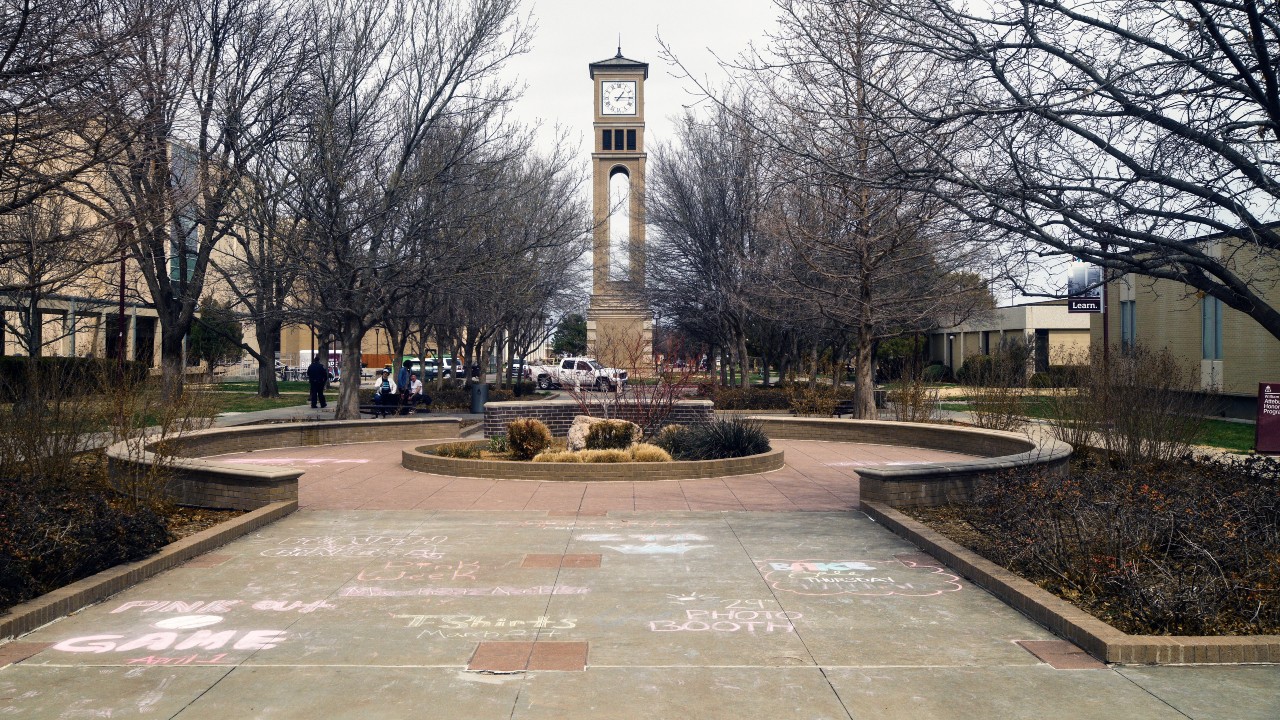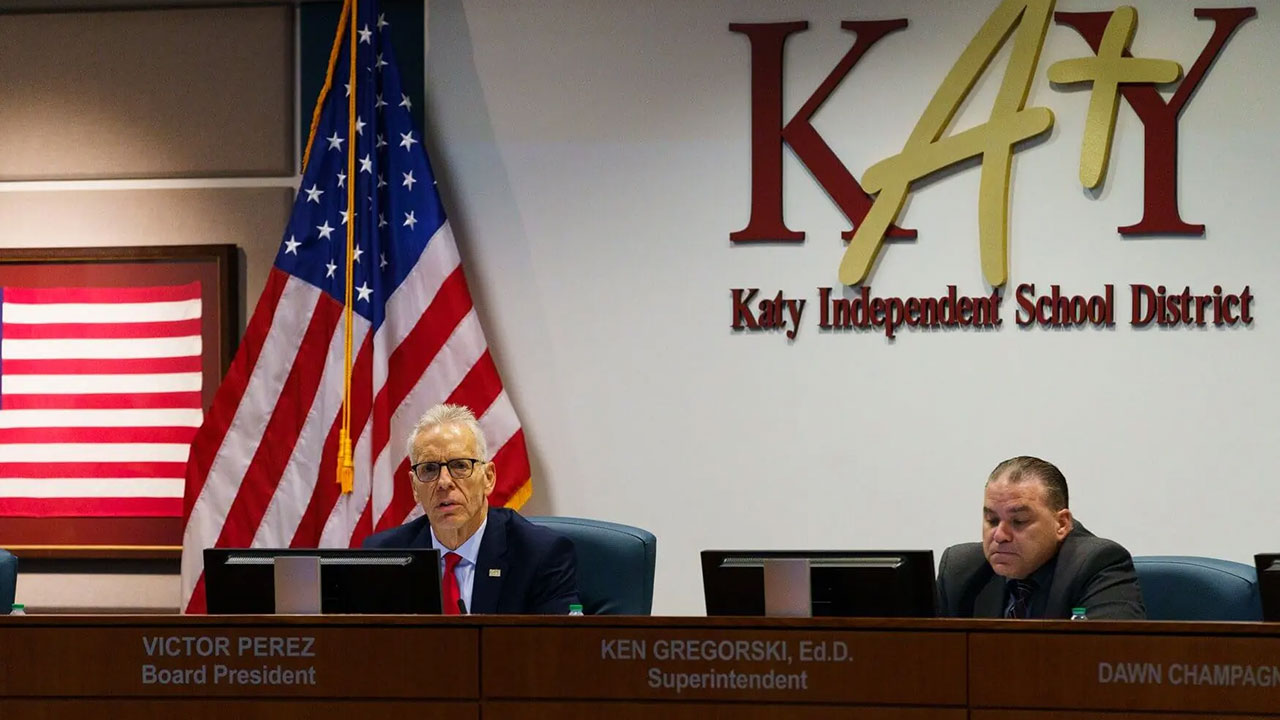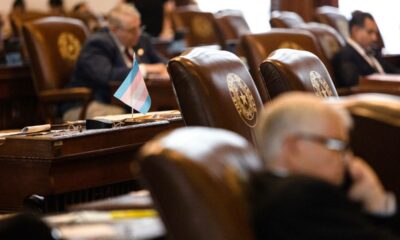US
Targeted by Politicians, Trans Youth Struggle With Growing Fear and Mental Health Concerns

This article originally appeared in Kaiser Health News.

Charlie Apple had experienced people calling into question his humanity, suggesting he was just a confused kid or even a moral aberration. As a transgender teen, he had accepted that his future could include discrimination, verbal abuse, and violence. The sense of peace he said he felt in transitioning physically, however, was worth the risk.
Still, it was especially painful last year, Apple said, when Texas lawmakers used the same sort of dehumanizing language he’d heard on the playground as they debated whether to deny trans kids everything from participation in sports to gender-affirming medical care.
“Seeing these people who are supposed to protect you, who are supposed to make laws to protect children, say all these horrible things and make it clear that you are not worth fighting for?” said Apple, 18, who testified with his parents against several anti-trans bills in Texas. “That’s a whole different thing.”
State legislators across the country introduced a record number of anti-transgender bills in 2021, many specifically targeting trans youth. Texas lawmakers proposed nearly 50 such bills, including an unsuccessful bill that could have sent parents to prison and placed their children in foster care if they approved gender-affirming treatments. In the first week of 2022 alone, legislators in at least seven states proposed bills targeting LGBTQ+ youth. On Feb. 3, South Dakota Gov. Kristi Noem signed a bill banning transgender girls and college-age women from playing on female sports teams. It becomes the 10th state to pass such a ban.
The debate isn’t limited to the United States. In 2020, three judges from the United Kingdom’s high court ruled against the use of puberty blockers for those 16 and younger, saying it was unlikely youth could give informed consent. The decision was overturned in September 2021.
As health care providers continue to discuss best practices, the larger debate outside of medicine amid these legislative efforts to restrict access to care is having a detrimental impact on transgender youth, said Dr. Aron Janssen, vice chair of Lurie Children’s Hospital’s psychiatry and behavioral health department in Chicago.
“These are kids who are already quite vulnerable. We know that suicide rates among transgender youth are incredibly high,” Janssen said. “We would anticipate that legislative efforts that are created to reduce access to lifesaving care are going to have negative consequences.”
In a survey from the Trevor Project conducted last fall, 85% of LGBTQ+ youth reported that recent debates about anti-trans bills have negatively affected their mental health. In a survey conducted in 2020, the nonprofit that serves LGBTQ+ youth and focuses on crisis intervention found 42% of LGBTQ+ youth reported seriously considering suicide in the previous year, including more than half of transgender and non-binary youth.
“What I am concerned about is that something that is doing significant and documented harm to the health and well-being of LGBTQ youth is being seen as a highly effective political tactic and means of fundraising,” said Casey Pick, a senior fellow for advocacy and governmental affairs at the Trevor Project. “It scares me that LGBTQ youth are being sacrificed to a political process.”
In the past year, Pick said, the Trevor Project’s lifeline and digital crisis services had more than 200,000 calls, emails, and texts from across the country — about 14,500 of them coming from Texas.

Mary Elizabeth Castle, a senior policy adviser for Texas Values, a faith-based advocacy organization that has worked to advance legislation banning gender-affirming care, said more bills are coming.
“Our position at Texas Values, and with our research, is that kids should not have access to any puberty blockers, cross-sex hormones, or any gender transition surgeries,” she said. “A lot of these kids claiming they are going through gender dysphoria are dealing with the normal problems preteens face, just realizing themselves and finding their identity.”
Numerous medical associations, including the American Academy of Pediatrics, the American Medical Association, the Pediatric Endocrine Society, and the American Psychiatric Association, have endorsed gender-affirming care.
The amped-up political heat has caused repercussions. The Texas Department of Family and Protective Services removed from its website a resources page for LGBTQ+ youth that included information about suicide prevention and the Trevor Project hotline after criticism from a conservative Texas gubernatorial candidate. At least one Texas school district reportedly also blocked access to LGBTQ+ resources, such as the Trevor Project, but reinstated some of them after students protested.
Those pullbacks are especially concerning, said Pick, because LGBTQ+ kids are overrepresented in the child welfare system and are less likely than other children to have access to appropriate mental health and medical care or internet access outside of school or child welfare agencies. Compared with their peers, LGBTQ+ kids who have been in foster care also are more likely to report attempting suicide, according to the Trevor Project.
“Regardless of what they think about trans youth, and whether it’s real or not, you’d think they would want to prevent suicides,” said Laura Edwards-Leeper, an Oregon clinical psychologist who helped found a U.S. clinic offering assessment and medical interventions for transgender youth. “If they really cared about young people, they would be putting their energy into allocating more resources to areas that are lacking in the field.”
Edwards-Leeper has advocated for improved training for therapists and increased diligence in exploring mental health concerns beyond gender identity before a patient begins medical interventions such as puberty blockers and cross-sex hormones. But, she said, medical intervention is appropriate for some youth.

“My feeling is that these things, especially the treatment of these kids, should not be left up to the courts or lawmakers,” said Edwards-Leeper. “It should really be in the hands of mental health and medical providers who are trained to do that work.”
Dr. Jason Rafferty, a Rhode Island pediatrician and psychologist who authored a 2018 American Academy of Pediatrics policy statement on supporting trans kids, said current political rhetoric and legislation are not grounded in science. Medical protocols for transgender people are not new, he said, adding that politicizing the delivery of medical care to transgender youth is both inappropriate and damaging.
“By taking away books or banning websites, you can’t erase people’s experiences,” he said. “Kids are still feeling what they are feeling; they’re now just feeling more isolated and alone and won’t have those references to help normalize their feelings as part of the human experience. That’s scary when we’re talking about emotional and psychological health and development.”
In Tucson, Arizona, Lizette Trujillo, who has a 14-year-old transgender son, said she is well versed in overcoming societal barriers as the American-born daughter of Mexican immigrants. But when her son came out as transgender, she and her husband worried their child would be further marginalized.
Trujillo has learned how to locate safe businesses and neighborhoods for her son. Still, he has dealt with anti-trans slurs at school. And, she said, it is increasingly difficult.
“There is this exhaustion and this disappointment that we are still having these same conversations and these same fights over and over,” said Trujillo.
Ultimately, the legislation and surrounding discourse targets children, said Dr. Terrance Weeden, an adolescent medicine fellow at Lurie Children’s Hospital.
“This is just who these children, these youth, are,” said Weeden. “They did not wake up one morning and decide ‘Hey, I want to be part of this community that’s ostracized, looked down upon, made fun of, that’s isolated.’”

Despite concerns about the impact of future legislation and surrounding rhetoric on LGBTQ+ youth, Apple remains hopeful things can improve.
“I am a human being and I am also trans,” he told KHN. “I am a mosaic of experiences and identities, with joy and sorrow and happiness and love, just as you are. Seeing us as the multifaceted human beings that we are is the first step in fighting this.”
KHN (Kaiser Health News) is a national newsroom that produces in-depth journalism about health issues. Together with Policy Analysis and Polling, KHN is one of the three major operating programs at KFF (Kaiser Family Foundation). KFF is an endowed nonprofit organization providing information on health issues to the nation.
Education
Feds investigate another Texas school district for its gender identity mandate
Katy ISD’s board voted this past fall to require staff to notify parents if their child wants to use a different pronoun or identifies as a different gender.

This article originally appeared in The Texas Tribune
 The U.S. Department of Education’s Office for Civil Rights opened an investigation Monday into Katy Independent School District’s gender identity policy on the basis of gender harassment under Title IX. The investigation came nine months after the Houston Landing reported that the district adopted a policy that notifies parents if their child requests to use a different name or pronouns at school.
The U.S. Department of Education’s Office for Civil Rights opened an investigation Monday into Katy Independent School District’s gender identity policy on the basis of gender harassment under Title IX. The investigation came nine months after the Houston Landing reported that the district adopted a policy that notifies parents if their child requests to use a different name or pronouns at school.
Katy ISD did not respond to a request of how many parents have been notified this year under the new policy, which requires staff to inform parents that students are transgender or ask to use different names or pronouns.
The Houston Chronicle reported in December that the district had notified parents at least 23 times since the policy was adopted.
The gender identity policy also bars schools from teaching “gender fluidity” and denies students from competing in sports with the gender they identify with, which mirrors state legislation already regulating K-12 athletics.
Students Engaged in Advancing Texas, a student-led advocacy group, filed a complaint with the U.S. Department of Education in November regarding the policy. Katy ISD graduate and member of SEAT Cameron Samuels labels the investigation as a win against the conservative policies being passed in the district.
“Elected solely on platforms to target marginalized students, far-right school board candidates accomplished exactly what they were elected to do: weaponize identity and neglect students’ educational needs,” they said.
Title IX prohibits sex-based discrimination in educational settings or federally funded activities. Gov. Greg Abbott has loudly voiced his opposition to the federal law recently ordering the Texas Education Agency to disregard the Biden administration’s expansion of Title IX.
“The district is committed to offering equal educational opportunities to our entire community,” a spokesperson from Katy ISD told the Tribune in a response to the investigation. “While we have received the OCR filing and deny any wrongdoing, we are committed to remaining fully cooperative and responsive throughout the process.”
Victor Perez, Katy ISD board president and proponent of the policy, argued that the policy was “mischaracterized” by community members as an attack on its queer and transgender students and instead relieves the burden for staff withholding information from parents. The policy was passed at a board meeting in August with a vote of 4-3 after four hours of public comment.
Alastair Parker, a member of the Cinco Ranch High School Gender-Sexuality Alliance, spoke at the board meeting in opposition to the policy.
Parker and others argued that the policy infringes on the rights of transgender kids to express themselves and opens them to potential harm if they are outed to transphobic parents or caregivers.
Johnathan Gooch from Equality Texas, a nonprofit advocacy group for LGBTQ+ Texans, said he hopes students recognize their power to report policies like this in the wake of the increasing number of legislation targeting LGBTQ+ youth.
This isn’t the first instance in Texas of a gender related policy being investigated on the federal level. Carroll ISD in Tarrant County was reported to have eight open investigations last February after it eliminated protections over race, religion, gender and sexual orientation.
There are documented mental health benefits to using preferred pronouns. A research team at the University Texas at Austin conducted a study in which they concluded that students in gender-affirming environments report 71% fewer symptoms of severe depression, a 34% decrease in reported suicidal ideation and a 65% decrease in suicide attempts.
“When students place their trust in teachers and school administration, the school has a duty to preserve that trust,” Gooch said. “That duty requires schools to ensure that no disclosure would place a student in harm’s way.”
Parker has been out as a transgender man since the seventh grade and is supported by his father, who he resides with. He acknowledged that this isn’t the case for many of his classmates as some have parents that are less accepting.
His teachers have gone by his preferred name and pronouns for his entire high school experience. But since the policy has been enacted, he has seen some of his peers go by their deadnames fearing that their parents would be notified.
Over the past year, other schools across the state have adopted similar policies.
Keller ISD, which is also in Tarrant County, passed a policy in late June that prevents students from using their preferred name and pronouns or using restrooms with the gender they identify with.
The policy was met with retaliation from the Texas American Civil Liberties Union, writing in a letter to the district that the policy is “deeply invasive and unlawful for school administrators to interrogate students’ private medical information in this way.”
As the end of the school year nears, Parker observed the policy being enforced at varying levels of severity by teachers. The passing of legislation or policy like this deters from the ongoing health crisis for queer and transgender youth and is wholly unnecessary, he said.
“If a child’s not telling their parents something like that, it’s for a reason,” he said. “I know that most of the people who are in favor of this are the ones who bounce off whatever their parents have told them to repeat.”
Disclosure: Equality Texas has been a financial supporter of The Texas Tribune, a nonprofit, nonpartisan news organization that is funded in part by donations from members, foundations and corporate sponsors. Financial supporters play no role in the Tribune’s journalism. Find a complete list of them here.
The Texas Tribune is a nonpartisan, nonprofit media organization that informs Texans — and engages with them – about public policy, politics, government and statewide issues.
Amarillo
Appeals court considers whether West Texas A&M drag show was unconstitutionally banned
University President Walter Wendler canceled a drag performance last year, claiming such shows “denigrate and demean women.”

This article originally appeared in The Texas Tribune
 A federal appeals court considering whether West Texas A&M University’s president violated the First Amendment when he canceled a campus drag show last year focused many of their questions Monday on a U.S. Supreme Court ruling that upheld campus non-discrimination policies.
A federal appeals court considering whether West Texas A&M University’s president violated the First Amendment when he canceled a campus drag show last year focused many of their questions Monday on a U.S. Supreme Court ruling that upheld campus non-discrimination policies.
But the panel of three judges used that 2010 case — which said universities can require groups to admit LGBTQ+ students — to suggest that school officials could also ban drag shows because some people find the performances offensive to women.
A lawyer representing a group of West Texas A&M students who’ve twice attempted to host a drag show on campus argued before the 5th U.S. Circuit Court of Appeals Monday that President Walter Wendler discriminated based on viewpoint and censored speech when canceling the performances.
In March 2023, Wendler banned drag shows in response to a student fundraiser that featured drag performers. The president argued the performances “denigrate and demean women,” and shouldn’t be allowed on the public university’s campus.
In September, a federal judge said Wendler acted within his authority to cancel the drag show. In his opinion, U.S. District Judge Matthew Kacsmaryk wrote, at “this point in Free Speech jurisprudence, it is not clearly established that all ‘drag shows’ are categorically ‘expressive conduct.’”
Last month, students with WT Spectrum, the student group at the university, hoped to hold another drag show on campus — to show support for the LGBTQ+ community in a staunchly conservative corner of Texas.
With Wendler’s campus-wide ban still in place, the Supreme Court declined to intervene and the president again ordered the fundraiser from taking place.
The panel of judges hearing the appeal Monday were James Dennis, James Ho and Leslie Southwick.
Many of their questions centered around Christian Legal Society v. Martinez, a case in which the Supreme Court upheld a policy of the University of California, Hastings College of the Law, that bars student groups from excluding members based on status or beliefs.
In 2010, the Supreme Court affirmed that Hastings’ policy does not violate the First Amendment rights of CLS, a group of students that wanted to be officially recognized on campus while not allowing people who engage in “unrepentant homosexual conduct” from joining.
The 5th Circuit judges Monday seemed to suggest that Wendler’s ban was no different from the policy at the center of the 2010 Supreme Court case. One of the judges, who didn’t identify themselves before speaking, asked if plaintiffs intended to use the case in question to overturn CLS.
“Maybe we should overturn CLS?” one of three judges said. “Many people would like CLS overturned.”
Ho equated the policy upheld in CLS with Wendler’s drag ban. He said both intend to make everyone feel included, but the policies have the consequence of targeting one group. In CLS’ case, he said that Christians were singled out on Hastings’ campus for not allowing LGBTQ+ individuals to join. Ho said that previous groups on Hastings’ campus could exclude members, but CLS was singled out by the university’s non-discrimination policy.
JT Morris, senior attorney for the Foundation for Individual Rights and Expression who represented the students, argued that the judges were comparing “apples to oranges” between the two cases.
Morris argued CLS is about a content-neutral policy, while Wendler was clearly discriminating based on viewpoint.
“The First Amendment does not allow the government to use the subjective term ‘offensive’ to restrict speech,” Morris said.
Joseph N. Mazzara, a lawyer with the Texas Attorney General’s Office who represented Wendler, said the students had not suffered any injury as a result of the no-drag policy because there was no future event featuring drag performers planned. Additionally, Mazzara said Wendler’s policy carried no criminal penalties and students could host drag performances off campus.
Mazzara said Wendler’s ban was not a free speech violation, but rather it was akin to banning certain conduct, like skateboarding on the grounds of a monument. He said drag shows constituted conduct, not speech.
“They’re able to do everything they want to do, they’re able to say all the speech they want to [say],” Mazzara said, referring to the student group WT Spectrum. “They just can’t do this one particular thing in this one particular place.”
A judge asked Mazzara how the university would have treated drag shows put on by other student groups, such as a fraternity. The judges seemed to agree with Mazzara that Wendler’s restriction did not target a specific viewpoint.
“If a Christian legal group wanted to have a ‘Drag for Jesus’ event that would also be banned,” Mazzara said.
One judge suggested that some drag shows are offensive to the transgender community, and thus Wendler’s ban would equally protect that population from offensive performances.
Allison Marie Collins, another lawyer from the Attorney General’s Office representing other defendants named in the lawsuit, argued the appellate judges should not impose any restrictions on Texas A&M system Chancellor John Sharp or West Texas A&M Vice President for Student Affairs Christopher Thomas. She argued an injunction against Sharp or Thomas would be overbroad, because it’s clear that only Wendler has acted to stop these shows.
“Neither Chancellor Sharp nor Dr. Thomas have remotely engaged in viewpoint discrimination, exclusion from a public forum or a prior restraint complaint to speech,” Collins said.
In his rebuttal, Morris argued the plaintiffs have standing over Sharp because he has the authority over Wendler to put an end to this restriction on free speech.
“He has the authority to do what’s best for the campus,” Morris said of Sharp. “He should have put an end to this prior restraint, which shouldn’t have lasted a day, and has now lasted a year.”
Disclosure: Texas A&M University and West Texas A&M University have been financial supporters of The Texas Tribune, a nonprofit, nonpartisan news organization that is funded in part by donations from members, foundations and corporate sponsors. Financial supporters play no role in the Tribune’s journalism. Find a complete list of them here.
The Texas Tribune is a nonpartisan, nonprofit media organization that informs Texans — and engages with them – about public policy, politics, government and statewide issues.
Education
Under Katy ISD gender policy, student identities disclosed to parents 19 times since August
Public records obtained by the Houston Landing offer the first glimpse at how often the new, hotly contested policy has been used to disclose LGBTQ+ students’ identities to parents — even if the students aren’t ready.

 Since narrowly passing a controversial gender policy two months ago, Katy Independent School District has sent 19 notifications informing parents that their child identified themselves as transgender or requested to use different names or pronouns at school.
Since narrowly passing a controversial gender policy two months ago, Katy Independent School District has sent 19 notifications informing parents that their child identified themselves as transgender or requested to use different names or pronouns at school.
The number of parental notifications, obtained by the Houston Landing through a public records request, is the first glimpse at how often the new, hotly contested policy has been used to disclose LGBTQ+ students’ identities to parents — even if the students aren’t ready.
So far, the district averages a notification to a parent roughly once every three days.
The district’s policy requires staff to inform parents if their student requests to use different pronouns or names, or if they identify themselves as transgender — and obtain written parental consent to comply with the request. It also prohibits employees from asking for students’ preferred pronouns and discussing “gender fluidity,” and requires students to use bathrooms that align with their sex assigned at birth.
Jarred Burton, a student leader at Tompkins High School’s Sexuality and Gender Alliance, said the number of notifications already sent to parents is both depressing and surprising. Critics, including Katy parents, LGBTQ+ students and local advocates, have blasted the policy as a dangerous measure with the potential to expose students’ gender identities to unsupportive parents, further harming a community that already faces a higher risk of mental health issues than their peers.
“It’s just sad to see this actually happening,” Burton said. “It shows that (the policy) is not a bluff.”
Board members who supported the policy hailed it as a measure that would center parents’ right to be informed about their child’s gender identity and protect teachers from making uncomfortable decisions about concealing such information from parents.
“(Parents are) supposed to be looking after the health and welfare of their child,” Board President Victor Perez said at a late August meeting. “Withholding that information from the parent, that is a great burden on staff.”
It’s unclear how many parents were already aware of their child’s gender identity. District officials also did not make any board members available for an interview on the matter.
“The policy is intended to provide parents and guardians the opportunity to be made aware of their child’s name change request, and the opportunity to grant or deny approval of said request,” Katy spokesperson Nick Petito said in a statement Wednesday.

Ash Thornton, a transgender man and a junior at Tompkins High School, said the number of notifications being sent home will discourage LGBTQ+ students from feeling safe to explore their identities.
“It signals that it’s something bad, them being transgender or expressing gender in a way that’s different,” Thornton said. “It definitely messes up student-teacher relationships.”
Employees are not required to comply with a student’s name or pronoun change even if a parent gives consent, the policy states.
One staff member on every campus is responsible for processing and sending notifications to parents and guardians, Petito said. The policy makes an exception for “cases of suspected abuse.”
Students belonging to LGBTQ+ clubs have told the Landing the policy has caused their schools to become less of a safe space and has instilled fear among LGBTQ+ youth in Katy.
“There’s just been this looming cloud of dread over a lot of people,” Burton said in a September interview. “There’s gonna be a lot of people that get in trouble by their parents or get hurt. … It just sometimes keeps me up at night a little bit because it’s hard to imagine how much hate people can have to pass something like this.”
The number of notifications sent to parents to date leaves Thornton to wonder what else is to come.
“It’s only been two months and there’s already 19, how many more people are going to be affected by even just the end of the semester?” he said.
The Houston Landing is a nonprofit newsroom devoted to public service journalism for all Houstonians.
This article first appeared on the Houston Landing and is republished here with permission.















